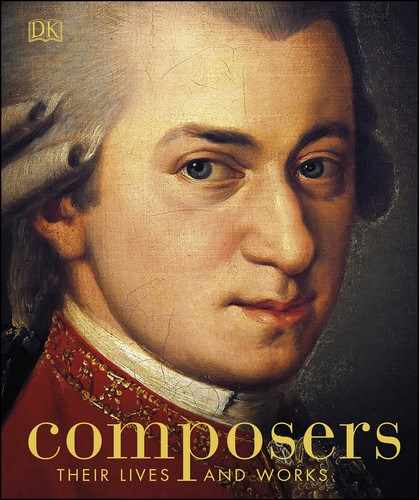Leoš Janáček
1854–1928, CZECH
Janáček forged a musical language closely influenced by the speech patterns of his native Czech, but also by intense personal tragedy. After a long struggle for recognition, his music remains popular today.

LEOS JANACEK
Janáček was considered by some of his teachers and, later, students to be a somewhat difficult personality—defiant, opinionated, uncompromising. But his musical genius was undoubted and he went on to become one of the most innovative composers of the early 20th century, whose work drew inspiration from opera, the concert hall, folk music, Russian literature, and the patterns and rhythms of the Czech language.
ON TECHNIQUE
Speech patterns
An interest in folklore was shared by many nationalist composers in central Europe during Janáček’s lifetime, but his use of speech patterns was entirely new. He would notate the pitches and rhythms of the spoken Czech language and examine how “speech tunes” altered according to context and the speaker’s state of mind. This enabled him to break free from the specter of Wagner and develop his music in a different way. The technique powers his operas such as The Cunning Little Vixen, but also his choral masterpiece, the Glagolitic Mass, and even his instrumental works, such as the Sinfonietta.
Much like his older compatriot and friend Antonín Dvořák, Leoš Janáček was an all-around musician. Born in Hukvaldy, Bohemia, in 1854, Leoš became a choirboy at the Abbey of St. Thomas in Brno; later, he studied at the organ school in Prague and then piano, organ, and composition in Leipzig. His teachers were impressed by his talent, although some regarded him as a problematic personality. At first, he eked out a living by giving piano lessons and conducting amateur choirs, while composing on the side.
In 1881, Janáček founded an organ school in Brno, and married one of his pupils, Zdenka Schulzová. During the next few years, his interest in folk music grew. He began collecting and studying traditional songs and dances of the region and in the early 1890s he became effectively the leader of folklorist activities in Moravia and Silesia, often translating elements of this musical language into his own compositions. From about 1879, too, he started transcribing the intonations of speech. In 1909, he acquired an Edison phonograph, which he used to record folk song, much as Bartók did in Hungary.
Janáček’s influences from opera and the concert hall included Smetana, Dvořák, and Tchaikovsky—but he detested Wagner. He developed his own operas in a highly individual direction, using speech patterns (see box). He often based works on Russian literature; his first string quartet is modeled on Tolstoy’s The Kreutzer Sonata, and two of his operas, Katya Kabanová and From the House of the Dead, on Ostrovsky and Dostoyevsky respectively.

LEOS AND ZDENKA JANACEK
Janáček and his wife and former pupil, Zdenka Schulzová, are shown here in 1881, the year of their marriage and of the founding of his organ school in Brno.

HOUSE OF THE DEAD
The handwritten score for Janáček’s powerful final opera, From the House of the Dead, which was published 10 years after the end of World War II.
Tragedy and turmoil
A turning point came in 1903 with the tragic death of his daughter, Olga. Janáček’s grief found some outlet in his piano music, including the suites On an Overgrown Path and In the Mists. The murder of a young political protester in 1905 inspired an intense and agonized piano sonata.
Janáček’s marriage was now under strain, and after he had an affair with the opera singer Gabriela Horvátová, his wife attempted suicide. The married couple remained together, but were estranged. However, the relationship that made most impact on his music was an infatuated yet chiefly platonic friendship with a far younger woman, Kamila Stösslová, whom he met in 1917. Their letters provided him with great inspiration for his work; many of his finest operas and chamber works date from these years, notably Katya Kabanová and the string quartet Intimate Letters. It was only now, too, that his works began to achieve the full recognition that he had craved.
During an excursion to the countryside with Stösslová and her son, Janáček contracted a chill, which became pneumonia. He died of the illness on August 28, 1928.

FOLK DANCES IN MORAVIA
Title page of the score for Janáček’s Folk Dances in Moravia. The composer was inspired by Moravian traditions to produce a radically new form of music.
“ I hear music constantly in the empty silence, while the intellect is stilled and all emotional strings are relaxed. ”
LEOS JANACEK
